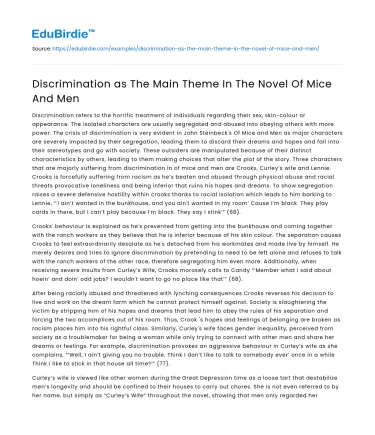Discrimination refers to the horrific treatment of individuals regarding their sex, skin-colour or appearance. The isolated characters are usually segregated and abused into obeying others with more power. The crisis of discrimination is very evident in John Steinbeck's Of Mice and Men as major characters are severely impacted by their segregation, leading them to discard their dreams and hopes and fall into their stereotypes and go with society. These outsiders are manipulated because of their distinct characteristics by others, leading to them making choices that alter the plot of the story. Three characters that are majorly suffering from discrimination in of mice and men are Crooks, Curley’s wife and Lennie. Crooks is forcefully suffering from racism as he’s beaten and abused through physical abuse and racial threats provocative loneliness and being inferior that ruins his hopes and dreams. To show segregation raises a severe defensive hostility within crooks thanks to racial isolation which leads to him barking to Lennie, “‘I ain’t wanted in the bunkhouse, and you ain't wanted in my room‘ Cause I’m black. They play cards in there, but I can’t play because I’m black. They say I stink’” (68).
Crooks' behaviour is explained as he's prevented from getting into the bunkhouse and coming together with the ranch workers as they believe that he is inferior because of his skin colour. The separation causes Crooks to feel extraordinarily desolate as he's detached from his workmates and made live by himself. He merely desires and tries to ignore discrimination by pretending to need to be left alone and refuses to talk with the ranch workers of the other race, therefore segregating him even more. Additionally, when receiving severe insults from Curley’s Wife, Crooks morosely calls to Candy “‘Member what I said about hoein’ and doin’ odd jobs? I wouldn't want to go no place like that’” (68).
Save your time!
We can take care of your essay
- Proper editing and formatting
- Free revision, title page, and bibliography
- Flexible prices and money-back guarantee
After being racially abused and threatened with lynching consequences Crooks reverses his decision to live and work on the dream farm which he cannot protect himself against. Society is slaughtering the victim by stripping him of his hopes and dreams that lead him to obey the rules of his separation and forcing the two accomplices out of his room. Thus, Crook 's hopes and feelings of belonging are broken as racism places him into his rightful class. Similarly, Curley's wife faces gender inequality, perceived from society as a troublemaker for being a woman while only trying to connect with other men and share her dreams or feelings. For example, discrimination provokes an aggressive behaviour in Curley’s wife as she complains, “‘Well, I ain’t giving you no trouble. Think I don’t like to talk to somebody ever’ once in a while Think I like to stick in that house all time?’” (77).
Curley’s wife is viewed like other women during the Great Depression time as a loose tart that destabilize men’s longevity and should be confined to their houses to carry out chores. She is not even referred to by her name, but simply as “Curley’s Wife” throughout the novel, showing that men only regarded her as a possession of Curley’s. The stereotypes cause her to miserably roam around the farm hunting for company amongst a ranch that is filled with men, never intending to cause harm. Additionally, Curley’s wife contemptuously says that she is, “‘standin’ here talkin’ to a bunch of bindle stiffs- a nigger an’ a dum-dum and a lousy ol’ sheep - and’ likin’it because they ain’t nobody else’” (78).
This unmannerly behaviour stems from the isolation and frustration of being unable to fulfil her hopes and desires because of the inequality she experiences within the Soledad Society. She vigorously lists the biases in which the men are perceived by society tormenting Crooks for his colour, Lennie for his unintelligence and Candy for his age in order to protect herself and hide the outrage caused by the discrimination. Therefore, Curley’s wife is affected by the societal view of a typical woman, sparking a dependability on flirtatious behaviour and insults to conceal the pettiness and pointlessness of her life.
Discrimination is a strong factor that destroys the ambitions and dreams of many victims that are affected. The main characters in John Steinbeck's Of Mice and Men is a great example due to their different physical or mental abilities. Two major examples of this is Crooks who throughout the novel is abused and threatened due to his skin colour and Curley’s wife who is due to her loneliness and hope getting taken away looks for attention in others. The story ultimately describes the evils of a worldwide crisis, easily showing the reader its application in a society during a huge period of struggle.






 Stuck on your essay?
Stuck on your essay?

